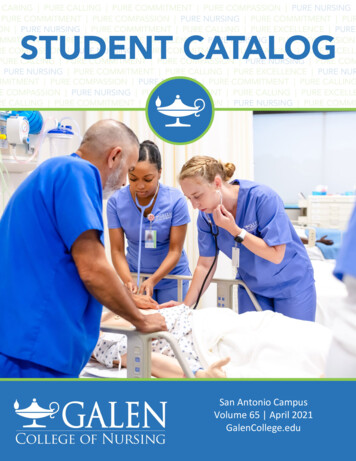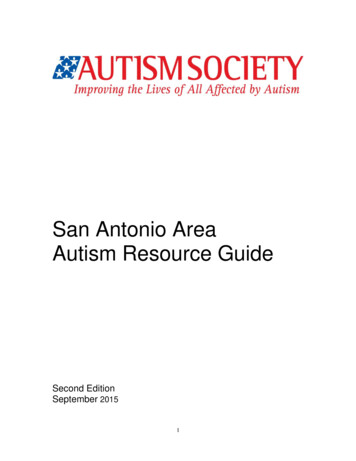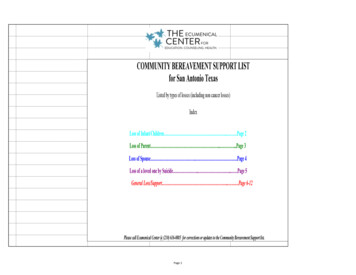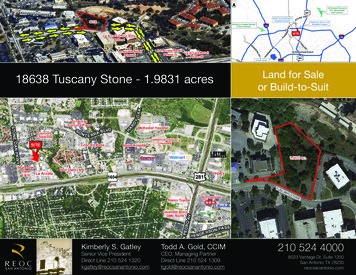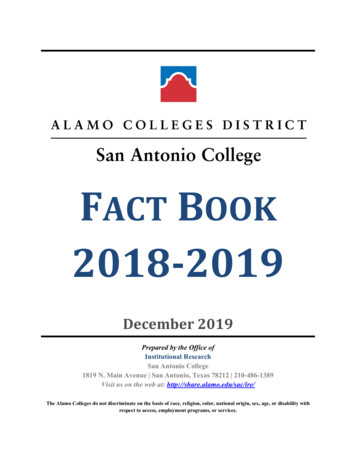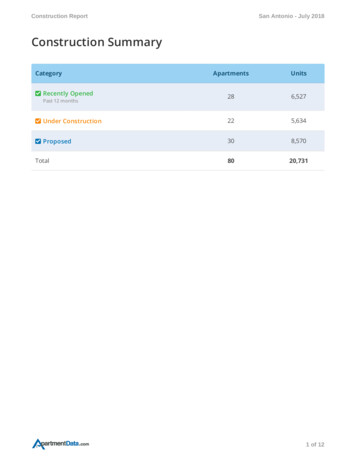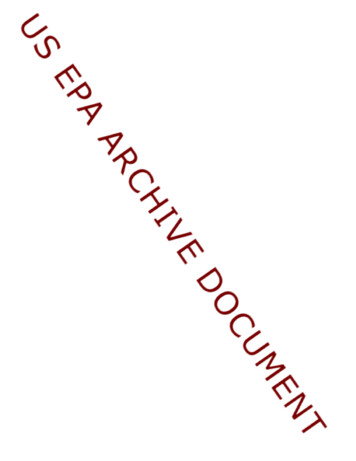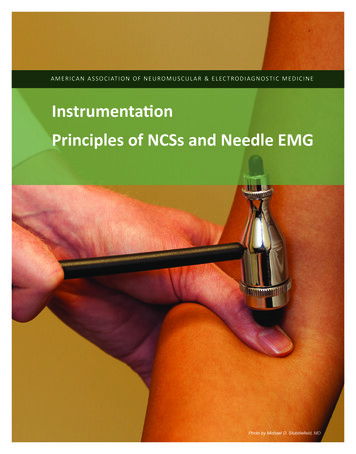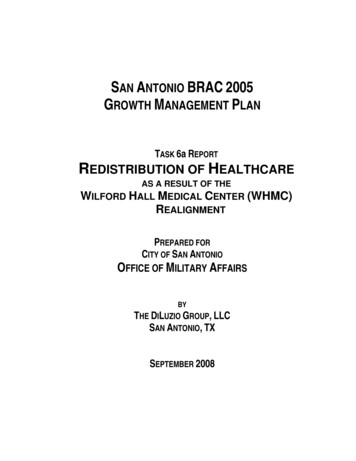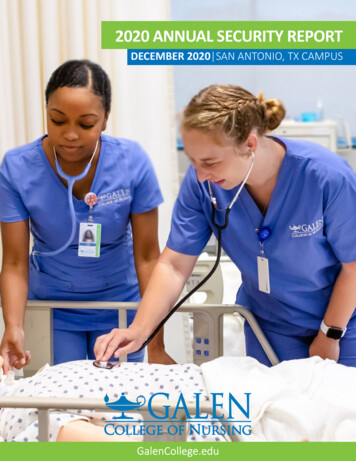
Transcription
2020 ANNUAL SECURITY REPORTDECEMBER 2020 SAN ANTONIO, TX CAMPUSGalenCollege.edu
Galen College of Nursing - San Antonio2020 ANNUAL SECURITY REPORTIntroductionThis report is provided in compliance with the Jeanne Clery Disclosure of Campus Security Policy and CrimeStatistics Act, as amended. It provides students and employees of Galen College of Nursing ("College") withinformation on: the College's security arrangements, policies and procedures; programs that provideeducation on such things as drug and alcohol abuse, awareness of various kinds of sex offenses, and theprevention of crime generally; and procedures the College will take to notify the campus community in theevent of an emergency. Its purpose is to provide students and employees with information that will helpthem make informed decisions relating to their own safety and the safety of others.Policy for Preparing the Annual ReportThis report is prepared by the Office of Regulatory Affairs and Compliance in cooperation with local lawenforcement authorities and includes information provided by them as well as by the College's campussecurity authorities and various other elements of the College. Each year an e-mail notification is made toall enrolled students and employees that provides the website link to access this report. Prospectivestudents and employees are also notified of the report's availability. Hard copies of the report may also beobtained at no cost by contacting compliance@galencollege.edu.The College is committed to taking the actions necessary to provide a safe and secure working/learningenvironment for all students and staff. As a member of the campus community, you can feel safe andcomfortable knowing that security procedures are in place that represent best practices in the field, andare constantly tested and re-evaluated for their effectiveness.General Safety and Security PoliciesCampus Security Personnel & Relationship with Local Law EnforcementThe College does not have a campus security or police department.While the College does not have any written agreements with local law enforcement agencies, it doesmaintain a close working relationship with local police.Campus Security AuthoritiesThe College has designated certain officials to serve as campus security authorities. Reports of criminalactivity can be made to these officials. They in turn will ensure that the crimes are reported for collectionas part of the College's annual report of crime statistics. The campus security authorities to whom theCollege would prefer that crimes be reported are listed below. Matthew Sheehan, Director of Campus Operations at msheehan@galencollege.edu; 210-485-2277(office) Patrick Nehls, Regional Director of Campus Operations at pnehls@galencollege.edu; 727-258-6816(office) Jennifer E. Green, Director of Accreditation, Institutional Effectiveness, and Regulatory Affairs atjgreen@galencollege.edu; 502-410-6262 (office)1 Page
Reporting a Crime or EmergencyThe College encourages accurate and prompt reporting of all criminal actions, emergencies, or otherincidents occurring on campus, on other property owned by the College, or on nearby public property tothe appropriate administrator and appropriate police agencies. Such a report is encouraged even when thevictim of a crime elects not to make a report or is unable to do so. If a crime is in progress or there is some other situation posing imminent danger, local lawenforcement can be reached by dialing 911. All criminal actions detected during school operating hours should also be reported to the frontdesk at (210) 733-3056 who in turn will notify the school administrator on site. Galen supports theenforcement of all local, state, and national laws and will cooperate with appropriate lawenforcement agencies in this activity. Students, staff, and visitors may also report situations to one of the campus security authoritiesidentified above. Once reported, the individual may also be encouraged to report the situation tothe appropriate police agency. If requested, a College staff member will assist in making the reportto police. Victims or witnesses are encouraged to report crimes to Campus administration, and may contactthe Office of Regulatory Affairs and Compliance at compliance@galencollege.edu to report crimesand instances where the individual wants to remain anonymous or report confidentially, within theparameters of the law.Confidential ReportingThe College will protect the confidentiality of victims. Only those with a need to know the identity forpurposes of investigating the crime, assisting the victim or disciplining the perpetrator will know thevictim's identity.There are certain employees at the College who are required to report to the Title IX Coordinator whenthey become aware of alleged sexual misconduct (including, but not limited to, dating violence, domesticviolence, sexual assault, and stalking), including providing the status of the parties if known. Confidentialresources, including the School Counselor, may not report this type of information without the permissionof the victim, thus allowing the victim to keep the report confidential. A victim of other types of crimes(e.g., aggravated assault, burglary, etc.) who does not want to pursue action within the College disciplinarysystem or the criminal justice system is nevertheless encouraged to make a confidential report to a campussecurity authority or the School Counselor. Upon the victim’s request, a report of the details of the incidentcan be filed with the College without revealing the victim’s identity. Such a confidential report complieswith the victim’s wishes, but still helps the College take appropriate steps to ensure the future safety of thevictim and others. With such information, the College can keep an accurate record of the number ofincidents involving members of the campus community, determine where a pattern of crime may bedeveloping and alert the community as to any potential danger. These confidential reports are countedand disclosed in the annual crime statistics for the College.The College encourages its professional counselors, if and when they deem it appropriate, to inform theperson they are counseling to report crimes on a voluntary, confidential basis for inclusion in the annualreport of crime statistics. The College does not have pastoral counselors.Security of and Access to Campus FacilitiesGalen is committed to the safety of all students, faculty, and staff. Student, faculty, and staff are requiredto wear a photo identification badge when on campus or at a clinical site. These badges are provided whenstudents begin their program of study and to employees on the first day of employment.2 Page
Entry doors to all campus facilities are locked and require either a security access code or swipe card toenter the premises. The codes are changes on a regular basis and swipe cards deactivated for inactivestudents and employees to ensure proper security access privileges. In addition, Galen may employsecurity to verify ID badges and disseminate visitor badges.Security Considerations in the Maintenance of FacilitiesEach campus facility is leased, and the College relies on the building landlord and management to make theappropriate repairs to keep the facility safe and in good working order. The Galen Facilities Departmentworks to identify maintenance issues on campus that may be safety hazards. Safety checks are completedto identify street or safety lights that are not functioning properly, or to determine if shrubs or otherlandscaping might need trimming. Appropriate building management is notified for action. Maintenancepersonnel regularly check to ensure there is adequate lighting on pathways and that egress lighting isworking in hallways and stairwells.Educational Programs Related to Security Awareness and Prevention of Criminal ActivityThe College seeks to enhance the security of its campus and the members of the campus community byperiodically presenting educational programs to inform students and employees about campus securityprocedures and practices, to encourage students and employees to be responsible for their own securityand the security of others and to inform them about the prevention of crimes. These programs arediscussed below.The College provides information at the beginning of each academic term for students and employeesregarding the College’s security procedures and practices. This information can be found in the StudentHandbook, Employee Handbook, and on digital display around campus. Among other things, it advisesstudents and employees of the importance of reporting criminal activity, to whom crimes should bereported, being responsible for their own safety and the safety of others and practices regarding timelywarnings and emergency notifications.Crime prevention programs are also presented annually by the Office of Regulatory Affairs and Complianceand the campus's Title IX Coordinator during National Prevention Week.Monitoring Off Campus Locations of Recognized Student OrganizationsThe College does not have any officially recognized student organizations with off campus locations andtherefore does not monitor or record criminal conduct occurring at such locations.Disclosure of the Outcome of a Crime of Violence or Non-Forcible Sex OffenseUpon written request, the College will disclose to the alleged victim of a crime of violence (as that term isdefined in section 16 of title 18, United States Code), or a non-forcible sex offense, the report on theresults of any disciplinary proceeding conducted by the College against a student who is the allegedperpetrator of such crime or offense. If the alleged victim is deceased as a result of such crime or offense,the next of kin of such victim shall be treated as the alleged victim for purposes of the paragraph.The previous paragraph does not apply to victims of dating violence, domestic violence, sexual assault, orstalking because under the Violence Against Women Act both the accused and accuser in these cases aregiven the results without the need to make a written request.3 Page
Drug and Alcohol PolicyThe College is committed to creating and maintaining an environment that is free of alcohol abuse. TheCollege prohibits the possession, use, and sale of alcohol beverage on campus or as any part of theCollege's activities, unless it is done so in accordance with applicable College policies, and it also enforcesthe state's underage drinking laws.The College also enforces federal and state drug laws. The possession, sale, manufacture or distribution ofillegal drugs is prohibited on campus or as any part of the College’s activities. Violators of the College'spolicies or federal and state laws regarding illegal drugs will be subject to disciplinary action and possiblycriminal prosecution.Federal Drug LawsDenial of Federal Benefits (21 U.S.C. 862) A federal drug conviction may result in the loss of federalbenefits, including school loans, grants, scholarships, contracts, and licenses. Federal drug traffickingconvictions may result in denial of federal benefits for up to five years for a first conviction. Federal drugconvictions for possession may result in denial of federal benefits for up to one year for a first convictionand up to five years for subsequent convictions.Forfeiture of Personal Property and Real Estate (21 U.S.C. 853) Any person convicted of a federal drugoffense punishable by more than one year in prison shall forfeit to the United States any personal or realproperty related to the violation, including houses, cars, and other personal belongings. A warrant ofseizure is issued and property is seized at the time an individual is arrested on charges that may result inforfeiture.Federal Drug Trafficking Penalties (21 U.S.C. 841) Penalties for federal drug trafficking convictions varyaccording to the quantity of the controlled substance involved in the transaction. Penalties for subsequentconvictions are twice as severe.If death or serious bodily injury results from the use of a controlled substance which has been illegallydistributed, the person convicted on federal charges of distributing the substance faces the possibility of alife sentence and fines ranging up to 10 million.Persons convicted on federal charges of drug trafficking within 1,000 feet of a university (21 U.S.C. 860)face penalties of prison terms and fines which are twice as high as the regular penalties for the offense,with a mandatory prison sentence of at least one year.Federal Drug Possession Penalties (21 U.S.C. 844) Persons convicted on federal charges of possessing anycontrolled substance face penalties of up to one year in prison and a mandatory fine of no less than 1,000. Second convictions are punishable by not less than 15 days but not more than two years in prisonand a minimum fine of 2,500. Subsequent convictions are punishable by not less than 90 days but notmore than three years in prison and a minimum fine of 5,000.4 Page
Drug and Alcohol State LawsCategorySummary (Texas Code Annotated)A Class B misdemeanor occurs if the amount of marijuana possessed is 2 ounces orless. A Class A misdemeanor occurs if the amount of marijuana possessed is between2 ounces and 4 ounces. See Tex. Health & Safety Code Ann. § 481.121. An individualadjudged guilty of a Class B misdemeanor will be punished by a fine not to exceedPossession of 2,000, confinement in jail for a term not to exceed 180 days, or both. An individualMarijuanaadjudged guilty of a Class A misdemeanor will be punished by a fine not to exceed 4,000, confinement in jail for a term not to exceed 1 year, or both. See Tex. PenalCode Ann. § 12.22. As the amount of marijuana increases, the crime classificationbecomes more severe and related penalties increase.Texas Health & Safety Code Ann. §§ 481.101 – 481.141 cover a wide range ofoffenses related to controlled substances. Penalties for the possession and deliveryof illegal drugs include prison sentences and monetary fines and vary widely by thetype of drug, amount confiscated, and whether the individual possessed orControlledmanufactured/delivered the controlled substance. Trafficking controlled substancesSubstanceswill result in more severe penalties.As an example, a person who possesses less than 28 grams of a controlled substancelisted in Penalty Group 3 (i.e., anabolic steroids) is guilty of a Class A misdemeanorpunishable by a fine not to exceed 4,000 and confinement in jail for up to 1 year.A minor who consumes alcohol outside the visible presence of the minor’s adultparent/guardian or spouse is punishable by a fine of 250 to 2,000 andimprisonment for up to 180 days. The court may also impose penalties likecommunity service, driver’s license suspension, and education or treatment. See Tex.Alcoholic Beverage Code Ann. § 106.04. A minor may possess an alcoholic beveragewhile in the course and scope of the minor’s employment. See Tex. AlcoholicBeverage Code § 106.05.An adult 21 years of age or older who is not a minor’s parent/guardian or spouse isliable for damages proximately caused by the intoxication of a minor under the age of18 if the adult served the minor or allowed the minor to be served alcoholicAlcohol and Minorsbeverages that contributed to the minor’s intoxication on the premises owned orleased by the adult. See Tex. Alcoholic Beverage Code Ann. § 2.02.A person may purchase an alcoholic beverage for or give an alcoholic beverage to aminor if the person is the minor’s adult parent/guardian or spouse and is visiblypresent when the minor possesses or consumes the alcoholic beverage. See Tex.Alcoholic Beverage Code Ann. § 106.06.A minor commits an offense if the minor falsely states that he/she is 21 years of ageor older or presents any document that indicates he/she is 21 years of age or older toa person engaged in selling or serving alcoholic beverages. See Tex. AlcoholicBeverage Code Ann. § 106.06.One is guilty of driving while intoxicated if he or she has a blood alcoholconcentration of 0.08 percent or more. This is a Class B misdemeanor, with aDriving Whileminimum term of confinement of 72 hours. An offender can also be subject to fines,Intoxicated (DWI)revocation/suspension of license, a vehicle interlock system, and educationalprograms. See Tex. Penal Code Ann. § 49 et seq. and Tex. Transp. Code Ann. §524.022.5 Page
Drug and Alcohol Abuse Prevention ProgramIn compliance with the Drug Free Schools and Communities Act (DFSCA), the College has a drug and alcoholabuse prevention program, which includes an annual notification to students and employees regardingcertain drug/alcohol-related information (such as legal sanctions for violations of applicable laws, healthrisks, etc.) and a biennial review of this program to evaluate its effectiveness and assess whether sanctionsare being consistently enforced. For more information, see below. Galen's drug/alcohol policies applicable to students can be found on the Consumer Disclosurespage of our website under the "Drug Law Violations" and "Federal and State Drug TraffickingPenalties" headings: https://galencollege.edu/consumer-disclosures. The Drug Free Policy is published in the "Health & Safety" section of the Student s/2020/10/San Antonio Catalog OCT 20.pdf. The College also has a Drug-free Workplace Policy available on its internal Employee ResourceCenter. For more information about the biennial review of the College’s drug and alcohol abuse preventionprogram, please contact the Office of Regulatory Affairs and Compliance atcompliance@galencollege.edu.Policies, Procedures, and Programs Related to Dating Violence,Domestic Violence, Sexual Assault, and StalkingConsistent with applicable laws, the College prohibits dating violence, domestic violence, sexual assault,and stalking. The College's policy used to address complaints of this nature, as well as the procedures forfiling, investigating and resolving complaints, may be found at: Equal Opportunity, Discrimination, and Harassment Policy:https://galencollege.edu/accommodations Resolution of Grievances Policy and Procedure - Disabilities, Discrimination, Harassment, andRetaliation: https://galencollege.edu/accommodations Sexual Harassment Policy & Investigative Procedures - .pdfThe following sections of this report discuss the College's educational programs to promote the awarenessof dating violence, domestic violence, sexual assault and stalking; provides information concerningprocedures students and employees should follow and the services available in the event they do becomea victim of one of these offenses, and advises students and employees of the disciplinary procedures thatwill be followed after an allegation that one of these offenses has occurred.Primary Prevention and Awareness Program:The College conducts a Primary Prevention and Awareness Program (PPAP) for all incoming students andnew employees. The PPAP advises campus community members that the College prohibits the offenses ofdating violence, domestic violence, sexual assault and stalking. They are also informed of the topicsdiscussed below, including relevant definitions, risk reduction, and bystander intervention.6 Page
Crime DefinitionsCrime Type (TexasCode Annotated)DefinitionsThe institution had determined, based on good-faith research, that the criminalstatutes of Texas do not define the term dating violence.However, Section 71.0021 of the Texas Family Code provides the following:a. "Dating violence" means an act, other than a defensive measure to protectoneself, by an actor that: (1) is committed against a victim or applicant for aprotective order: (A) with whom the actor has or has had a datingrelationship; or (B) because of the victim's or applicant's marriage to or datingrelationship with an individual with whom the actor is or has been in a datingrelationship or marriage; and (2) is intended to result in physical harm, bodilyinjury, assault, or sexual assault or that is a threat that reasonably places thevictim or applicant in fear of imminent physical harm, bodily injury, assault, orsexual assault.b. For purposes of this title, "dating relationship" means a relationship betweenDating Violence (Tex.individuals who have or have had a continuing relationship of a romantic orFam. Code Ann. §intimate nature. The existence of such a relationship shall be determined71.0021)based on consideration of: (1) the length of the relationship; (2) the nature ofthe relationship; and (3) the frequency and type of interaction between thepersons involved in the relationship.c. A casual acquaintanceship or ordinary fraternization in a business or socialcontext does not constitute a "dating relationship" under Subsection (b).In addition, Sections 51.251 and 51.281 of the Texas Education Code provide that“dating violence” shall have the meaning assigned by the Jeanne Clery Disclosure ofCampus Security Policy and Campus Crime Statistics Act (20.U.S.C. Section1092(f)(6)(A)). This law defines dating violence to mean violence committed by aperson (A) who is or has been in a social relationship of a romantic or intimate naturewith the victim; and where the existence of such a relationship shall be determinedbased on a consideration of the following factors: (i) the length of the relationship;(ii) the type of relationship; and (iii) the frequency of interaction between thepersons involved in the relationship.The institution has determined, based on good-faith research, that Texas law doesnot define the term domestic violence.However, Texas law does define the term "Family Violence" (Tex. Fam. Code Ann. §71.004) as follows: (1) an act by a member of a family or household against anothermember of the family or household that is intended to result in physical harm, bodilyDomestic Violenceinjury, assault, or sexual assault or that is a threat that reasonably places the memberin fear of imminent physical harm, bodily injury, assault, or sexual assault, but doesnot include defensive measures to protect oneself; (2) abuse [as defined under statelaw] by a member of a family or household toward a child of the family or household;or (3) dating violence, as that term is defined by Section 71.0021.Stalking (Tex. Penal Code Ann. § 42.072):a. A person commits an offense if the person, on more than one occasion andpursuant to the same scheme or course of conduct that is directed specificallyStalking (Tex. Penalat another person, knowingly engages in conduct that:Code Ann. § 42.072)1. constitutes an offense under Section 42.07, or that the actor knows orreasonably should know the other person will regard as threatening:(A) bodily injury or death for the other person; (B) bodily injury or7 Page
Crime Type (TexasCode Annotated)Sexual AssaultDefinitionsdeath for a member of the other person's family or household or foran individual with whom the other person has a dating relationship; or(C) that an offense will be committed against the other person'sproperty;2. causes the other person, a member of the other person's family orhousehold, or an individual with whom the other person has a datingrelationship to be placed in fear of bodily injury or death or in fear thatan offense will be committed against the other person's property, orto feel harassed, annoyed, alarmed, abused, tormented, embarrassed,or offended; and3. would cause a reasonable person to: (A) fear bodily injury or death forhimself or herself; (B) fear bodily injury or death for a member of theperson's family or household or for an individual with whom theperson has a dating relationship; (C) fear that an offense will becommitted against the person's property; or (D) feel harassed,annoyed, alarmed, abused, tormented, embarrassed, or offended.b. An offense under this section is a felony of the third degree, except that theoffense is a felony of the second degree if the actor has previously beenconvicted of an offense under this section or of an offense under any of thefollowing laws that contains elements that are substantially similar to theelements of an offense under this section:1. the laws of another state;2. the laws of a federally recognized Indian tribe;3. the laws of a territory of the United States;or4. federal law.c. For purposes of this section, a trier of fact may find that different types ofconduct described by Subsection (a), if engaged in on more than oneoccasion, constitute conduct that is engaged in pursuant to the same schemeor course of conduct.d. In this section:1. “Dating relationship,” “family,” “household,” and “member of ahousehold” have the meanings assigned by Chapter 71, Family Code;2. “Property” includes a pet, companion animal, or assistance animal, asdefined by Section 121.002, Human Resources Code.In addition, Sections 51.251 and 51.281 of the Texas Education Code provide that“stalking” shall have the meaning assigned by the Jeanne Clery Disclosure of CampusSecurity Policy and Campus Crime Statistics Act (20.U.S.C. Section 1092(f)(6)(A)). Thislaw defines stalking as engaging in a course of conduct directed at a specific personthat would cause a reasonable person to (A) fear for his or her safety or the safety ofothers; or (B) suffer substantial emotional distress.The Texas Penal Code provides the following definitions for sexual assault andaggravated sexual assault: Sexual Assault (Tex. Penal Code Ann. § 22.011): A person commits an offense:o If the person intentionally or knowingly: (A) causes the penetration ofthe anus or sexual organ of another person by any means, withoutthat person's consent; (B) causes the penetration of the mouth ofanother person by the sexual organ of the actor, without that person'sconsent; or (C) causes the sexual organ of another person, without8 Page
Crime Type (TexasCode Annotated)Definitions that person's consent, to contact or penetrate the mouth, anus, orsexual organ of another person, including the actor; oro Regardless of whether the person knows the age of the child at thetime of the offense, the person intentionally or knowingly: (A) causesthe penetration of the anus or sexual organ of a child by any means;(B) causes the penetration of the mouth of a child by the sexual organof the actor; (C) causes the sexual organ of a child to contact orpenetrate the mouth, anus, or sexual organ of another person,including the actor; (D) causes the anus of a child to contact themouth, anus, or sexual organ of another person, including the actor;or (D) causes the mouth of a child to contact the anus or sexual organof another person, including the actor.Aggravated sexual assault (Tex. Penal Code Ann. § 22.021): A person commitsan offense:o If the person: (A) intentionally or knowingly: (i) causes the penetrationof the anus or sexual organ of another person by any means, withoutthat person's consent; (ii) causes the penetration of the mouth ofanother person by the sexual organ of the actor, without that person'sconsent; or (iii) causes the sexual organ of another person, withoutthat person's consent, to contact or penetrate the mouth, anus, orsexual organ of another person, including the actor; or (B) regardlessof whether the person knows the age of the child at the time of theoffense, intentionally or knowingly: (i) causes the penetration of theanus or sexual organ of a child by any means; (ii) causes thepenetration of the mouth of a child by the sexual organ of the actor;(iii) causes the sexual organ of a child to contact or penetrate themouth, anus, or sexual organ of another person, including the actor;(iv) causes the anus of a child to contact the mouth, anus, or sexualorgan of another person, including the actor; or (v) causes the mouthof a child to contact the anus or sexual organ of another person,including the actor; ando If: (A) the person: (i) causes serious bodily injury or attempts to causethe death of the victim or another person in the course of the samecriminal episode; (ii) by acts or words places the victim in fear that anyperson will become the victim of an offense under Section20A.02(a)(3), (4), (7), or (8) or that death, serious bodily injury, orkidnapping will be imminently inflicted on any person; (iii) by acts orwords occurring in the presence of the victim threatens to cause anyperson to become the victim of an offense under Section 20A.02(a)(3),(4), (7), or (8) or to cause the death, serious bodily injury, orkidnapping of any person; (iv) uses or exhibits a deadly weapon in thecourse of the same criminal episode; (v) acts in concert with anotherwho engages in conduct described by Subdivision (1) directed towardthe same victim and occurring during the course of the same criminalepisode; or (vi) with the intent of facilitating the commission of theoffense; administers or provides to the victim of the offense anysubstance capable of impairing victim’s ability to appraise the natureof the act or to resist the act; (B) the victim is younger than 14 years of9 Page
Crime Type (TexasCode Annotated)Definitionsage, regardless of whether the person knows the age of the victim atthe time of the offense; or (C) the victim is an elderly individual or adisabled individual.In addition, Sections 51.251 and 51.281 of the Texas Education Code provide that“sexual assault” shall have the meaning assigned by the Jeanne Clery Disclosure ofCampus Security Policy and Campus Crime Statistics Act (20.U.S.C. Section1092(f)(6)(A)). This law defines sexual assault as any nonconsensual sexual actproscribed by Federal, tribal, or State law, including when the victim lacks capacity toconsent.Rape, Fondling,For purposes of the Clery Act, the term "sexual assault" includes the offenses of rape,Incest, Statutoryfondling, incest, and statutory rape. The institution has determined, based on goodRapefaith research, that Texas law does n
DECEMBER 2020 SAN ANTONIO, TX CAMPUS. 1 Page Galen College of Nursing - San Antonio 2020 ANNUAL SECURITY REPORT Introduction This report is provided in compliance with the Jeanne Clery Disclosure of Campus Security Policy and Crime Statistics Act, as amended. It provides students and employees of Galen College of Nursing ("College") with

